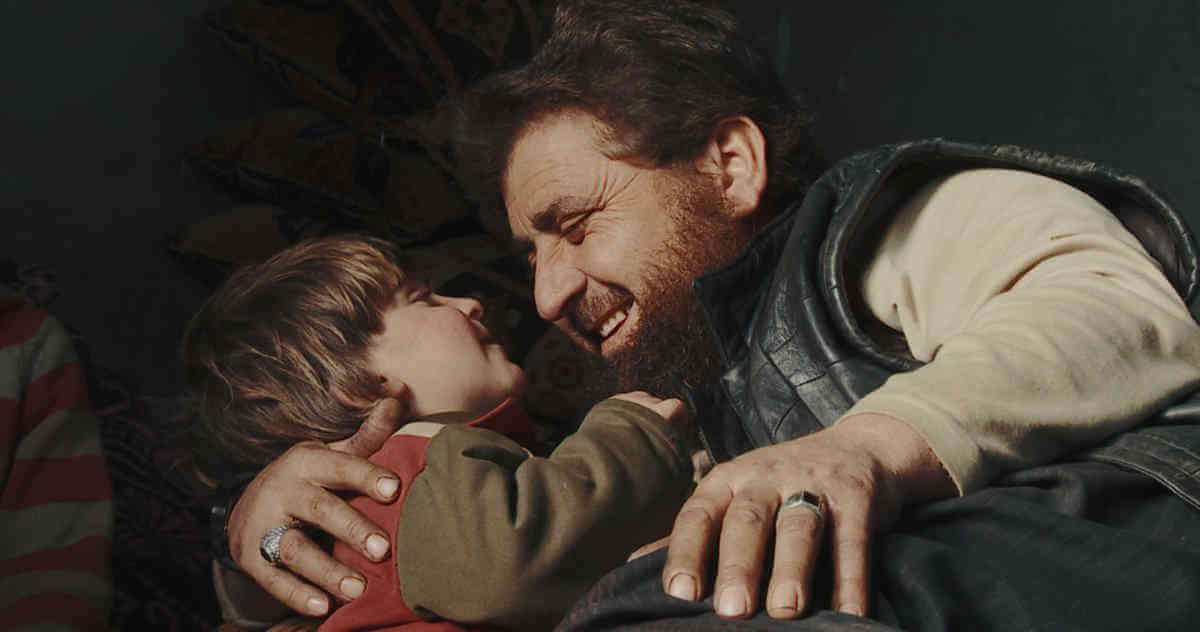Every scene in Syrian director Talal Derki’s “Of Fathers and Sons” is carefully placed to make a point. A portrait of a family dominated by Abu Osama, a soldier with the Salafi Islamist al-Nusra Front, it was shot over the course of 300 days during a two-year stretch from 2014 to 2016. Derki lied to get intimate access to his subjects, claiming to be sympathetic to fundamentalist Islam when he’s really an atheist who fled to Germany to escape the violence reflected in “Of Fathers and Sons” and to which the al-Nusra Front has helped contribute. Even the most seemingly innocuous shots in “Of Fathers and Sons” build toward the film’s argument. When Abu Osama’s sons play, their equivalent of jungle gyms are abandoned, rusty tanks.
Women are the film’s structuring absence. Abu Osama fathered 12 children, but there’s a reason Derki named it “Of Fathers and Sons.” The daughters remain off-screen. Even one of Abu Osama’s fellow Al-Nusra Front fighters thinks he takes the practice of making girls wearing a hijab too far by punishing his two-year-old for taking it off. In one initially harmless scene, his boys throw rocks at a wall and a lake, but it ends with their energy obviously directed toward nascent misogyny, as they aim them at distant girls.
Derki speaks about his own intentions and experiences in voice-over at the beginning and end of “Of Fathers and Sons.” He closes the film by leaving Syria, a country he says he no longer recognizes and returning to his own family in Berlin. Of course, the vast majority of his compatriots have no such option, and despite the pain of exile he’s at least managed to keep going as a director by returning to Syria to document its decline into violence. “Return to Homs,” made in 2013, was his first feature-length documentary. Abu Osama agreed to participate in this film in part because he liked it.
Matthew Heineman’s documentary “City of Ghosts,” released in the US last year, went as far as depicting ISIS executions to their conclusion on-screen. “Of Fathers and Sons” doesn’t go to that extreme, but it rides along with Abu Osama in some disturbing contexts including the prelude to an execution of captured rivals. Something happens halfway through the film that brings out his vulnerabilities, but by that point several of his sons have already begun paramilitary training.
One could accuse “Of Fathers and Sons” of heavy-handedness. Abu Osama truly loves his sons, but the moments where he cuddles and plays with them feel like grooming rather than real tenderness. “City of Ghosts” and Feras Fayyad’s “Last Men In Aleppo” had an easier time finding a consistent tone because they focused on people most Westerners would find honorable. “Of Fathers and Sons” chose to depict Islamic fundamentalism with empathy. But even though Derki knows the context of the conflict in Syria, as a filmmaker he’s more interested in shocking images of tween boys in uniform being trained to fight as insurgents than in explaining it. He drops the spectator into a horrifying, unpleasant situation in media res, assuming we know the background.
For long stretches, Derki lets his choice of scenes from Abu Osama and his family’s life speak for him, with no editorializing but an obvious point of view. He generally films the sons in long shot. But he also appears onscreen to talk with Abu Osama a few times. There, he tries to bring out the man’s politics. From what Abu Osama says, the “so-called moderates” and non-Islamist anti-Assad opposition in Syria are widely considered stained by their association with America and Europe. He views the war in Syria as the prelude to a Third World War and Armageddon — he’s sure this is on the way and thinks Christians and Jews all agree with him, although they differ on its starting point — that will lead to an apocalypse he gleefully anticipates.
Abu Osama sends his sons to their possible deaths in battle, but in that respect he’s not so different from American men who have supported our many wars. He’s just so passionate about his beliefs that he’s raised his sons from a very early age to be fighters instead of simply supporting war as an abstract cause. He’s an extreme example of the way most parents raise their children expecting that they will follow their values. The most popular documentaries in America over the past year testify to an understandable yearning for heroes and desire to find narratives in real life; the conclusions from “Of Fathers and Sons” are a great deal less comforting.
OF FATHERS AND SONS | Directed by Talal Derki | Kino Lorber | In Arabic with English subtitles | Nov. 16-Dec. 2 | Museum of the Moving Image, 36-01 35th Ave., Astoria | movingimage.us



































